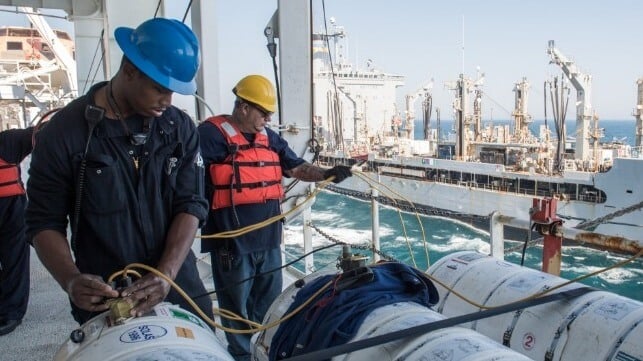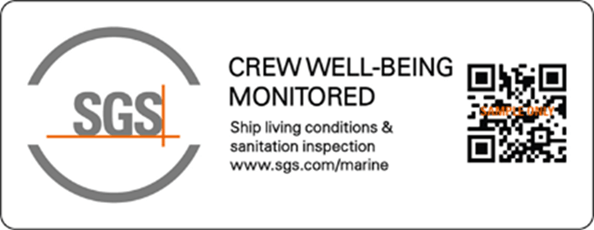SGS Crew Well-Being Monitored Program can Help Address Crew Happiness

Over the course of the pandemic and the resulting crew change crisis, the issue of crew happiness has been especially poignant and alarming. A new survey indicates that the satisfaction and well-being of ships’ crew members dropped alarmingly this year.
SGS’s new “Crew Well-Being” service can help.
As an extension of its offering in wellbeing programs in the hospitality and industry sectors, SGS, as a leader in the testing and inspection sector within the maritime industry, has developed the SGS Crew Well-Being Monitored Program. Its aim is to support seafarers, shipowners, and port States to raise the playing field to a higher standard using the Maritime Labour Convention (2006) as a guidepost.
Goals: This program aims to support the maritime industry by implementing approaches to risk management that support continuity in business. Notably, the SGS Crew Well-Being Monitored Program is not a certification program. Its objectives are solely to help improve living standards onboard vessels while decreasing the risks related to fines and detentions from port State control (PSC) inspections. It also provides shipowners with social license, helping them to act as industry leaders (i.e., meeting their Environmental Social Governance objectives).
How it works: An SGS Inspector, while onboard, will carries out an inspection following the SGS standard operating procedures using a 100-point checklist. The list has been developed to identify potential areas of deficiencies and areas of improvement for the vessel. The inspection may include a review of documentation (e.g., the Declaration of Maritime Labour Compliance) and inspections of common areas and accommodations, galley and food storage facilities, etc.
Visibility: As participants in the program (with at least two inspections per year), ships are given the “SGS Mark for Crew Well-Being Monitored”. It may be kept onboard the ship and used in email communications from the ship or as deemed necessary by the Master/owner of the vessel. The mark, which is generated under the approval of the SGS global headquarters in Geneva, is ship-specific and contains references to the ship through a QR code. The QR code allows access to the latest cloud-based inspection information from SGS (date, port of call, overview of the program, etc.). This permits the crew—as well as PSC officers—to retrieve general information about the program. A password may be used to access the individual reports produced by SGS Marine Field Services & Monitoring (drinking water results, indoor air quality, noise monitoring etc.), and it will ensure that this information is safeguarded by company-authorized personnel. This also facilitates the retrieval of reporting from the vessel when needed.
One particular area of concern in the recent assessment of crew happiness is access to safe drinking water. SGS routinely samples and tests drinking water onboard vessels as part of its global compliance offerings to the marine industry. As a basis, SGS uses selected parameters from the World Health Organization (WHO) Guide to Ship Sanitation 2011 and can adjust testing to requirements from specific flags (e.g., France, Germany, etc.).
Combining drinking water testing with the Crew Well-Being Monitored Program helps ensure the availability of safe drinking water for the crew and visitors to the vessels. Additionally, if crew members have confidence in the safety of the tap water onboard the ship—and in turn drink fewer (plastic) bottles of water—the volume of plastic waste generated by the vessel will be greatly reduced. Thus, drinking water testing can also has a positive impact on the ship’s garbage management under MARPOL Annex V.
In sum, SGS has developed a voluntary program to help identify and record areas of ship-borne public health risks and provide for better living conditions, which will benefit the crew. Additionally, it gives confidence to the crew, owners, and operators that they will comply with regulations and provide for lower chances of penalization from eventual PSC inspections. Similarly, it demonstrates to PSC Officers that owners are investing in—and are committed to—continuous performance improvement.
For more information about Crew Well-Being or other services offered by SGS Marine Field Services & Monitoring via our global network, please contact: [email protected]
About the authors
Lisa Drake, PhD manages marine environmental services in the Americas for SGS, the world's leading testing, inspection and certification company. She—along with a global team of experts—guides this work in >330 ports worldwide, including a newly opened marine laboratory in Panama.
Guillaume Drillet, PhD is the Regional Manager of SGS for Asia and Oceania Marine Services. He is the Chair of the Global TestNet, an organization with consultative status at the IMO that represents testing organizations, as well as Past Director of the Board of the World Aquaculture Society.
Ersi Zacharopoulou, MSc (Eng) is the Development Manager of SGS, Europe, Africa and Middle East Marine Services, and a member of Technical Chamber of Greece.
Vladimiro Bonamin, PhD, is the Environmental Services Global Business Development Manager at SGS and the Director of the Global Marine Field Services & Monitoring team.
The products and services herein described in this press release are not endorsed by The Maritime Executive.

